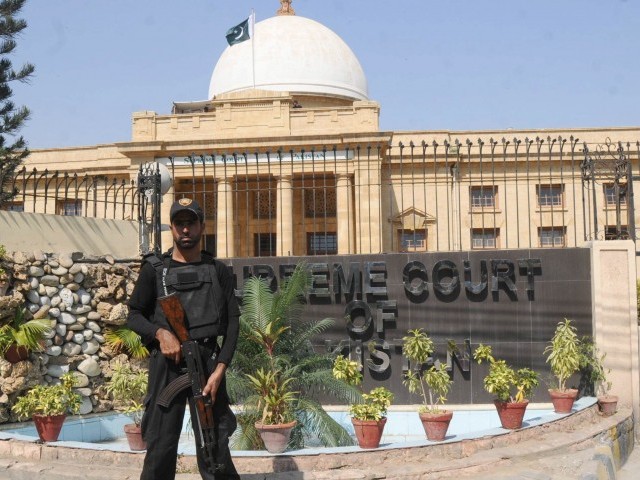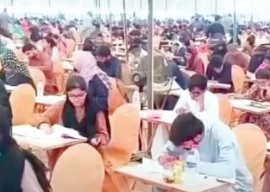
The Supreme Court (SC) has given the federal government 24 hours starting Thursday morning to appoint an IGP for Sindh on a permanent basis.
The apex court was hearing the Karachi law and order suo motu implementation proceedings at the SC Karachi registry when it gave these orders. Chief Justice (CJ) of Pakistan Tassaduq Hussain Jillani, who was heading the bench along with justices Khilji Arif Hussain and Amir Hani Muslim, also told the government to take steps to empower the paramilitary Rangers.
The proceedings emanate from a suo motu notice taken by the then chief justice Iftikhar Chaudhry of lawlessness when the city went through one of its worst summers in 2011. From time to time, the judges fly all the way from the capital to review the extent to which the federal, provincial and local governments have implemented their 20 key orders passed in the landmark judgment.
At the outset of the hearing, CJ Jillani inquired from the provincial law officers about the progress in controlling crime since the last month when the bench reviewed the situation and passed certain directions. Crime Investigation Department’s (CID) AIG Iqbal Mehmood, who is holding the charge of acting police chief since his predecessor, Shahid Nadeem Baloch, retired on February 21, explained that the crime rate has remarkably gone down.
But Jillani was shocked to learn that the provincial police chief has yet to be appointed on a permanent basis. “If there is no police chief to control the law and order situation, then what is the provincial government doing?” the bench remarked. At this point, the Rangers director-general was also complaining of being handicapped to deal with criminals in the city.
Additional advocate-general Muhammad Sarwar Khan said it is the duty of the federal government to appointment an IG on a regular basis but not the provincial government. “Tell the secretary establishment to appoint a regular IG within 24 hours,” instructed the visibly upset chief justice to the deputy attorney-general.
Jhat Pat Market attack
Earlier, the judges inquired from the acting IG about the deaths of numerous women and children in Lyari’s Jhat Pat Market. The fight was between the Uzair Baloch and Baba Ladla groups in the neighbourhood, Mehmood replied. He claimed that eight key members of the Lyari gangster groups have been killed in 19 encounters with the law enforcers.
Mehmood maintained that the targeted killings, extortion and kidnappings have gone down to a significant level, adding no policeman has been killed while no acts of terrorism have been reported in the last month.
Rangers’ powers
Meanwhile, Shahid Anwar Bajwa, the lawyer for Pakistan Rangers, complained that their paramilitary force is facing difficulties in successfully combating the criminals and feels handicapped as the ordinance through which certain powers were given to them has expired.
He also pointed out that the powers given to them by amending Section 5 and 11-EE of the Anti-Terrorism Act, 1997, to jointly run five police stations in the city, interrogate the criminals in high-profile cases and prepare the charge sheets have yet to be fully enjoyed by them.
Eleven special public prosecutors have been hired to represent the Rangers’ cases before the courts but this number is too less, Bajwa pointed out, adding that they have to wait to assign new high-profile cases till the prosecutors are done with the previous ones. The judges directed the Rangers lawyer to submit a report, outlining the problems they are facing, within three days. The bench also directed the deputy attorney-general to find out the status of the ordinance that empowered the Rangers to control the criminals.
Influential SSP case
The judges rejected the chief secretary’s report on Malir SSP Rao Anwar Khan. The bench had called the report on the services profile of Khan, including his years in police service, ranks given to him and his performance. During the last session, the SC wanted to know why Khan was restored in service even after his suspension in the aftermath of the Abbas Town bomb blasts.
SC calls records of land-grabbing cases
The Supreme Court (SC) has given three weeks to revenue authorities to submit details of charge-sheets submitted in cases of land grabbing.
A three-member bench, which was hearing the Karachi law and order suo motu implementation case, reprimanded the board of revenue’s senior member over his department’s failure to remove illegal encroachments from state-owned land - one of the reasons behind the escalating violence in the city. The judges noted that the post of the senior member of the revenue board was very important but the Sindh government always appointed an ailing and sick person to head the department.
While addressing the incumbent senior member, CJ Jillani made it clear that the prime responsibility of his post was to retrieve state-owned lands from illegal encroachers. He reprimanded the officer for appointing such an officer to head the Anti-Encroachment Cell (AEC), who was even not aware of the basic laws.
The member himself expressed dissatisfaction over the report presented by the AEC SSP on action taken against the encroachers and sought three weeks’ time to submit details of all cases registered by the AEC. The report would include details of charge-sheets submitted in cases.
Meanwhile, the AEC SSP was directed to bring the entire record of land-grabbing cases and come fully prepared to respond to the court’s queries.
Published in The Express Tribune, March 21st, 2014.

1725612926-0/Tribune-Pic-(8)1725612926-0-165x106.webp)




1732176172-0/Untitled-design-(8)1732176172-0-270x192.webp)
1732175528-2/Untitled-design-(5)1732175528-2-270x192.webp)









COMMENTS
Comments are moderated and generally will be posted if they are on-topic and not abusive.
For more information, please see our Comments FAQ